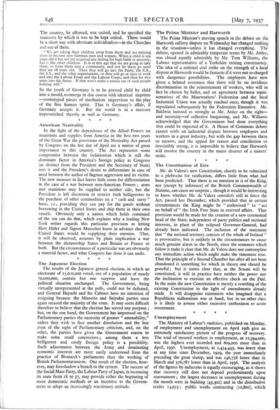American Neutrality In the light of the dependence of the
Allied Powers on munitions and supplies from America in the first two years of the Great War the provisions of the Neutrality Act passed by Congress on the last day of April are a matter of great importance to this country. The Act represents some compromise between the isolationism which is still the dominant factor in America's foreign policy as Congress (as distinct from the President and the Secretary of State) sees it and the President's desire to differentiate in case of need between the author of flagrant aggression and its victim. The new measure in fact leaves little room for differentiation in the case of a war between non-American Powers ; arms and munitions may be supplied to neither side, but the President is left discretion to restrict both belligerents to the purchase of other commodities on a "cash and carry" basis, i.e., providing they can pay for the goods without borrowing in the United States and ship them in their own vessels. Obviously only a nation which holds command of the sea can do that, which explains why a leading New York writer regards this particular provision as letting Herr Hitler and Signor Mussolini know in advance that the United States would be supplying their enemies. That, it will be observed, assumes by plain implication a war between the dictatorship States and Britain or France or both. But the circumstances of a particular war are obviously a material factor, and what Congress has done it can undo.














































 Previous page
Previous page